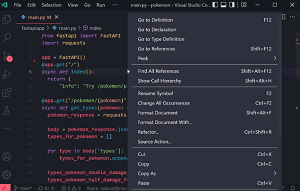News
Python in Visual Studio Code Gets 3 New Extensions
Microsoft's Python in Visual Studio Code dev team introduced three new extensions: Black Formatter, isort and Jupyter Powertoys.
The new tools, included in the May 2022 release of the Python and Jupyter extensions for VS Code, follow on last month's update in which the team announced it was breaking up its Python extension into separate offerings. That extension is by far the most popular one in the VS Code marketplace, with more than 53 million installations. It provides IntelliSense, linting, debugging and so on.
"Our team is working towards breaking the tools support we offer in the Python extension into separate extensions, with the intent of improving performance, stability and no longer requiring the tools to be installed in a Python environment -- as they can be shipped alongside an extension," said Karthik Nadig last month, noting that Pylint was the first target.
The work continued in this month's update.
"We now have a new extension for Black, the Python formatter. Similar to the pylint extension, this new extension uses the Language Server Protocol to provide formatting support, and it ships with the latest version of Black -- so you're no longer required to have it installed in a Python environment," said Soojin Choi, program manager.
 [Click on image for larger, animated GIF view.] Black Extension in Animated Action (source: Microsoft).
[Click on image for larger, animated GIF view.] Black Extension in Animated Action (source: Microsoft).
The isort extension, meanwhile, is used for sorting, as its name bespeaks. "When you open a file and your imports don't follow isort's standards, it will display an error diagnostic and provide a code action to fix the import order," Choi said.
Finally, the Jupyter Powertoys extension is an experimental option for working with Jupyter notebooks with prototype features including:
- Kernel management panel
- Contextual help
- Execution grouping
Along with the new extensions, the Jupyter tool can now be installed as a web extension for the online, web-hosted vscode.dev offering.
About the Author
David Ramel is an editor and writer at Converge 360.